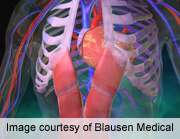About one-quarter of adult survivors of childhood cancer who received chest-directed radiation therapy have increased tricuspid regurgitant jet velocity, according to research published online Jan. 7 in the Journal of Clinical Oncology.
(HealthDay)—About one-quarter of adult survivors of childhood cancer who received chest-directed radiation therapy (RT) have increased tricuspid regurgitant jet velocity (TRV), according to research published online Jan. 7 in the Journal of Clinical Oncology.
Gregory T. Armstrong, M.D., of St. Jude Children's Research Hospital in Memphis, Tenn., and colleagues conducted a cross-sectional assessment involving 498 adult survivors of childhood cancer (median age, 38.0 years; median time from primary diagnosis, 27.3 years) to examine the prevalence of pulmonary hypertension, a late effect of cancer therapy.
The researchers found that 25.2 percent of survivors who received chest-directed RT and 30.8 percent of those who received more than 30 Gy had increased TRV. Increased TRV correlated with increasing dose of RT, body mass index more than 40 kg/m², and aortic valve regurgitation, in multivariate analysis. The odds of severe functional limitation on a six-minute walk were significantly increased for those with TRV more than 2.8 m/s versus those with a TRV ≤2.8 ms/s (odds ratio, 5.20).
"In conclusion, we identified an increased prevalence of TRV more than 2.8 m/s, which may indicate pulmonary hypertension, in a large, well-characterized population of childhood cancer survivors," the authors write. "Increased risk was associated with chest-directed RT exposure, potentially mediated through both cardiac and pulmonary dysfunction."
More information:
Abstract
Full Text (subscription or payment may be required)
Journal information: Journal of Clinical Oncology
Copyright © 2013 HealthDay. All rights reserved.





















